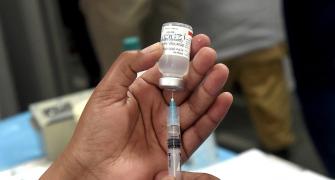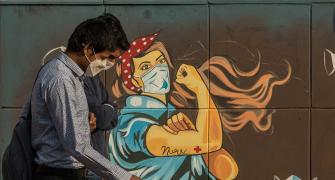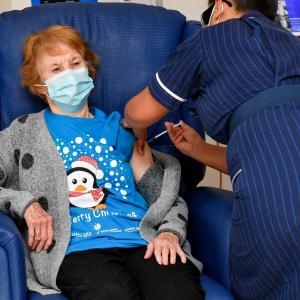The United Kingdom’s medicines regulator has confirmed seven cases of blood clot-related deaths in people who received the Oxford/AstraZeneca vaccine against COVID-19, but stressed on the safety of the jabs as there is no evidence of a causal link.

The Medicines and Healthcare Products Regulatory Agency said in its latest Yellow Card monitoring of the coronavirus vaccine programme this week that of the 18.1 million people who had the Oxford vaccine in the UK, 30 people developed blood clots and seven had died as of March 24.
Its official advice continues to be that the benefits of the vaccine, which is also being produced as Covishield by the Serum Institute of India, far outweigh any risks.
“Our rigorous review into the UK reports of rare and specific types of blood clots is ongoing. Up to and including 24 March, we have received 22 reports of cerebral venous sinus thrombosis and 8 reports of other thrombosis events with low platelets, out of a total of 18.1 million doses of COVID-19 vaccine AstraZeneca given by that date,” the MHRA report said.
“On the basis of this ongoing review, the benefits of the vaccines against COVID-19 continue to outweigh any risks and you should continue to get your vaccine when invited to do so,” it said.
The regulator said that investigations are underway to determine if there is a link or if the cases are a coincidence and reiterated that increased adverse reaction or ADR reports reflect the increase in vaccine deployment.
“The number and nature of suspected adverse reactions reported so far are not unusual in comparison to other types of routinely used vaccines. The overall safety experience with both vaccines is so far as expected from the clinical trials,” it adds.
The MHRA added that there were no blood clot reports for the Pfizer/BioNTech vaccine, the other jabs being rolled out in the UK.
Concerns had been raised about blood clots after a small proportion of cases arose among millions who received the Oxford/AstraZeneca jab across Europe. Some countries, such as Germany, have restricted its use to certain ages but the European medicines watchdog and the World Health Organisation both continue to advise that it is safe and effective.
As an additional measure, the British Society for Haematology has issued new guidance for doctors, amid concerns cases of blood clotting could be linked to a condition known as thrombocytopenia.
“At the moment, any causal association with coronavirus vaccination has not been established. However, if you identify patients with this syndrome in proximity to coronavirus vaccination, it is very important that you complete the online Yellow Card this will trigger a request from MHRA for further details," their guidance notes.
The MHRA has previously said that anyone who has had the vaccination and who then has a headache that lasts for more than four days afterwards, or bruising beyond the site of the vaccination after a few days, should seek medical attention.
Headache is also part of one of the most common side effects of the vaccine, others being flu-like symptoms which normally disappear within a day or two.
The latest MHRA review notes: “For both vaccines, the overwhelming majority of reports relate to injection-site reactions (sore arm for example) and generalised symptoms such as 'flu-like' illness, headache, chills, fatigue (tiredness), nausea (feeling sick), fever, dizziness, weakness, aching muscles, and rapid heartbeat.
"Generally, these happen shortly after the vaccination and are not associated with more serious or lasting illness.
“These types of reactions reflect the normal immune response triggered by the body to the vaccines. They are typically seen with most types of vaccine and tend to resolve within a day or two,” it notes.
To date, 31,301,267 people have had a first vaccine dose in the UK and 4,948,635 have had two doses.










